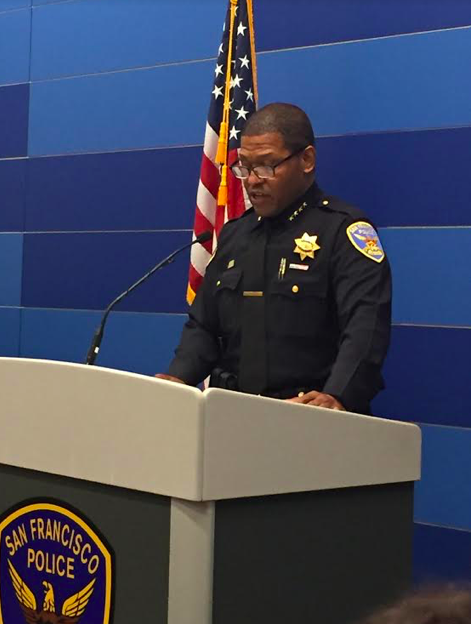The SF Police Commission is slated this week to approve a detailed overhaul of the rules for officers seeking search warrants. It’s the first time in 24 years that the rules have been updated, and there are plenty of changes.
But this entire process has happened with very limited public input. In fact, the Public Defender’s Office knew nothing about the new rules until last week. The District Attorney’s Office knew nothing about the changes until this week.

“Nobody in our office was involved in these discussions,” David Campos, chief of staff for DA Chesa Boudin, told me.
That despite the fact that many of the changes involve when officers need to notify the DA.
(UPDATE: Campos called back to tell me that it turns out someone in the office was involved somewhere in the process, but “we have not been involved lately and we were not shown the latest draft.”)
You can read the details of the changes here. Some of them are apparently the result of the cops breaking into a reporter’s apartment and seizing computers and files that are protected under state law. As part of a settlement in a lawsuit over that case, the city agreed to change its procedures.
Many of them are updates to state law—and to the profound changes in technology over the past two decades.
But the commission was prepared to approve the changes, drafted by the SFPD and the Department of Police Accountability, with virtually no public input last week.
At the Sept 8 commission meeting, Chief Bill Scott and Captain Jim Aherne, presented the new policies, and commission Vice President Cindy Elias offered some changes.
Among the items for discussion: How much information officers need to give judges about whether confidential informants, whose testimony might be central to a search warrant, were paid or given other benefits.
Department lawyer Kara Lacy argued that there are some benefits that informants might receive that the cops might not know about. Elias said that shouldn’t be an issue and that everything should be disclosed.
Since this is a huge deal, and the changes were made on the fly, mostly during a ten-minute recess, Commission President Malia Cohen suggested that the panel might put off a final vote for a week. But Chief Scott said he wanted it done right away, and the Cohen went along and said she was ready to vote on the policy that night.
Three people called in for public comment. One didn’t give a name but asked for a delay because “I’d like to see the ACLU and human rights groups on this call.”
Then Deputy Public Defender Brian Cox came on the line to raise the issue of what are known as no-knock warrants—searches where the cops break into a home or business with no notice. “The SFPD still seeks to engage in military-like tactics,” he said. “Many jurisdiction have banned the no-knock warrant. It has no place in 2021.”
A no-knock warrant led to the death of Breonna Taylor.
Deputy Public Defender Danielle Harris then spoke, saying that after litigating search-warrant issues for more than 20 years, she was surprised that “we have had this [proposed order] for less than three business days.”
She added: “I have some concerns about the procedure being followed.”
Well, yeah: The key parties who are involved in dealing with this part of the criminal justice system have, apparently, had zero input into a critical policy that deals with basic human and Constitutional rights.
I sat there watching the hearing and waiting for one commissioner to ask the chief: Did anyone at the department, during the two-year process or drafting this new general order, reach out to the DA, or the PD, or the ACLU, or the Lawyers Committee for Civil Rights, or anyone doing immigration law, or any of the media lawyers involved in the Carmody case?
Not one commissioner asked.
Instead, Cohen said she was prepared to call on vote on the GO right away.
But Commissioner James Byrne said that, as a matter of “appearance,” the panel ought to wait a week. Cohen asked for a motion to continue, and everyone went along.
So now this will be back Wednesday, at 5:30 pm. Here’s the info on how to watch and participate.
I am not a lawyer, and the new rules are dense and complicated, and I can’t tell you everything that’s right and wrong with them. But that’s the problem here: All the people who ought to be at the table were missing, except for the cops and the Department of Police Accountability.
(Oh, and the commission agreed that the department would “meet and confer” with the Police Officers Association on the new rules.)
And Cohen urged commission members “to be prepared to vote on this” Wednesday.
UPDATE: I received this comment from Yoel Haile, criminal justice director at the ACLU of Northern California:
The SFPD’s search warrant policy has serious consequences on people’s rights, freedom, and safety, and it is unacceptable for the police to unilaterally overhaul their own policies without consulting and incorporating feedback from the people and agencies that will be affected by the changes. Any updates need to be made transparently with sufficient room for public input. Instead of rubberstamping the policy, the Police Commission should refuse to hold a vote until the SFPD hears from the District Attorney’s office, Public Defender’s office, and the public.
This policy provides more specific guidance for seeking and executing warrants than the prior policy and incorporates specific information and reference to the requirements of CALECPA, which are welcome and needed changes.
However, the policy governing no-knock warrants gives officers far too much discretion, which we know can cost people – especially people of color – their lives. It includes exceptions that would let officers execute a no-knock warrant without authorization from a judge and doesn’t adequately distinguish between their use in drug investigations versus violent crimes.






